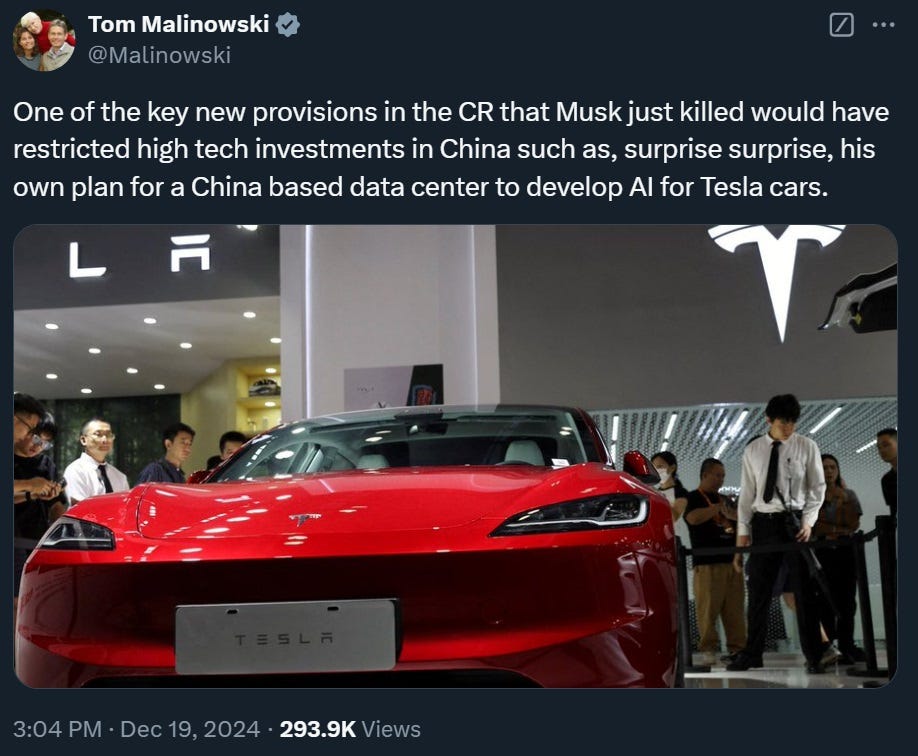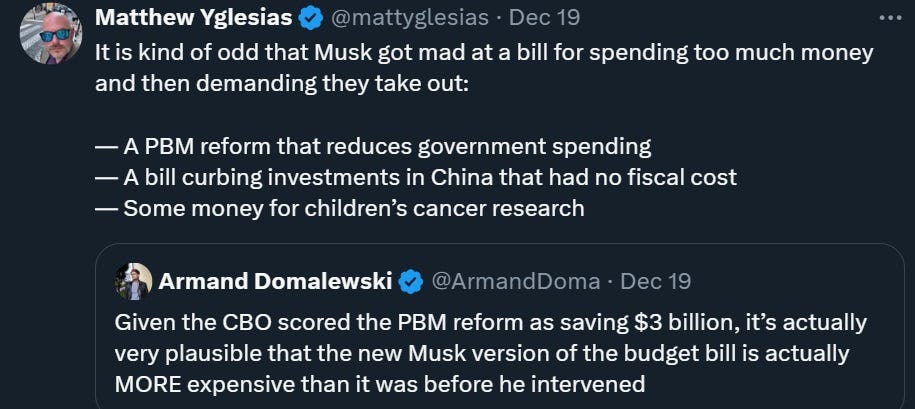[Smith has a good post up on capital flight. Not in any way relevant to the topic here, but I wanted to say something nice.]
I read this more than a couple of times to make certain that Smith didn't have his tongue in his cheek. This level of credulity and straw-manning had to be a joke, right? Sadly, no. This is absolutely consistent with what Smith has written about Musk in the past—and since.
As we've pointed out before, Noah Smith represents a small but wealthy and highly influential group of thinkers: technocratic techno-optimists, largely centered around the Bay Area and distinguished by a tendency to worship billionaire visionaries like Elon Musk and Marc Andreessen. Needless to say, the levels of cognitive dissonance have grown deafening around these fellows over the past few months.
Smith represents a viewpoint that carries extraordinary weight in places like The New York Times—which is reason enough to look closely and critically at what he's been saying. In this case, he's also being profoundly dishonest. He grossly misrepresents the arguments* of most of Musk’s detractors while being highly selective with his examples.
It would take me far longer to list the pertinent cases that Smith omitted than it probably took Smith to write the original post, but just to illustrate the point, here’s what I found after a five-minute Google search on Elon Musk’s love of free speech.
Vice: X Purges Prominent Journalists, Leftists With No Explanation
NBC News: Elon Musk worries free speech advocates with his calls to prosecute researchers and critics
The Guardian: Elon Musk has become the world’s biggest hypocrite on free speech
USA Today: When free speech champion Elon Musk threatens speech, we should take it seriously
The Verge: Elon Musk is absolutely not a ‘free speech absolutist’
The examples that Smith does include are mostly supported by Musk’s own version of events. For example, Elon Musk insists that he loves Jewish people—but I’m pretty sure there have been examples in the past of antisemites using that very same defense.
For more background, here's what you find if you follow Smith's link.
Elon Musk has publicly endorsed an antisemitic conspiracy theory popular among White supremacists: that Jewish communities push “hatred against Whites.”
That kind of overt thumbs up to an antisemitic post shocked
even some of Musk’s critics, who have long called him out for using
racist or otherwise bigoted dog whistles on Twitter, now known as X. It
was the multibillionaire’s most explicit public statement yet endorsing
anti-Jewish views.
ICYMI: Musk was responding to
a post Wednesday that said Jewish communities “have been pushing the
exact kind of dialectical hatred against whites that they claim to want
people to stop using against them.” The post also referenced “hordes of
minorities” flooding Western countries, a popular antisemitic conspiracy
theory.
It’s the kind of post you can find easily on X these days,
and likely would have gone unnoticed had Musk, with more than 160
million followers, not re-shared the post with the comment: “You have
said the actual truth.”
The antisemitic conspiracy theory — which posits that Jews
want to bring undocumented minority populations into Western countries
to reduce White majorities in those nations — is often espoused by hate
groups.
It’s the same conspiracy echoed in the final written words of Robert Bowers, the convicted murderer of 11 people
at the Tree of Life synagogue in Pittsburgh in 2018. His last social
media post said that a Jewish nonprofit dedicated to aiding refugees
“likes to bring invaders in that kill our people.” The mass shooting was
the deadliest attack against Jews in American history.
Musk, in subsequent posts, expounded on his views. He wrote
that he does not believe hatred of White people extends “to all Jewish
communities.” But then he singled out the Anti-Defamation League,
claiming that it promotes racism against White people.
Noah Smith Dec 21, 2024
Musk’s friends and confidantes expect the former. They probably know him as a reasonable guy — a Reaganite conservative who was driven to the center-right by the excesses of wokeness, who loves free speech and free enterprise and small government and responsible fiscal and monetary policy and peace between nations, who wants to bring human civilization to Mars and accelerate tech progress and so on.
Let us call this version of Elon “Real Elon”.
But
it’s possible to imagine another version of Elon, who exists in the
perfervid imaginations of his detractors. Let us call this “Evil Elon”.
Regular people, observing Elon’s actions in the public sphere, can’t
always tell the difference between Real Elon and this fantasy
supervillain.
Whereas Real Elon opposed the CR because of
concerns over government spending and legislative complexity, Evil Elon
opposed it because it contained national security provisions that would have nixed some of Tesla’s planned investments in China:
Cynics note
that the shorter replacement CR, which Elon supported, would have
actually spent more money than the CR that Elon killed — the main
difference being that the replacement CR didn’t contain restrictions on
U.S. investment in China:
In
fact, while Real Elon loves capitalism and individual freedoms, Evil
Elon is a consistent and dedicated ally of the Chinese Communist Party.
When Real Elon calls for Taiwan to become a “special administrative zone” of China,
he does it because he wants to avoid World War 3; Evil Elon does it
because he likes authoritarian rule, and because the Chinese Communist
Party has paid him off.
On Ukraine, similar, Real Elon just wants to end the conflict
and stop more Ukrainians from dying. After all, Russia is powerful and
determined enough that they’ll almost certainly be able to hold onto a
piece of Ukraine at the end of the war; why not just trade land for
peace and be done with it?
But Evil Elon wants Putin
to triumph, because he sympathizes with authoritarian rulers in
general. No one knows what Elon and Putin talked about during their frequent conversations since 2022. But believers in Evil Elon suspect that they conspired to bring about a Russian victory in the war.
When former U.S. Army officer Alex Vindman accused Elon of being used by Putin, Real Elon accused Vindman of treason
and threatened him with “the appropriate penalty” because hey, we all
get mad on social media and like to punch back at people who attack us.
But Evil Elon did it because Vindman was on to something.
When Real Elon declared his support for the German far-right party AfD, it was because he saw Germany spinning into industrial decline and suffering from an immigration policy that failed to exclude violent criminals. But Evil Elon did it because he likes that AfD is vocally pro-Putin and pro-CCP.
In fact, believers in Evil Elon suspect that his support for AfD might also be due to the whiff of Nazi apologia and antisemitism
that hang around some of the party’s candidates. Real Elon is a
stand-up guy — when he agreed with a tweet about Jewish communities
pushing anti-White hatred, he publicly apologized,
declaring it the worst tweet he’s ever done, and declaring himself a
“philosemite”. And when Real Elon accidentally endorsed a Tucker Carlson
interview with a Hitler apologist, he quickly deleted the endorsement once he realized what it actually contained.
But
believers in Evil Elon think that these are just the kind of public
relations moves that a supervillain would do to cover his tracks. They
fear that the massive wave of antisemitism that has swamped X
since Elon took over is the result of intentional boosting, rather than
simply the inevitable result of more lenient moderation policies
combined with the reaction to the Gaza war. They do not buy Real Elon’s protests that other platforms have even more antisemitism. ["Musk did not say who performed the audit or share any details from the
report. He did not answer any questions for other journalists." -- MP]
And
so on. Essentially, Evil Elon is a somewhat cartoonish supervillain,
who wants to set himself up as the ruler of one of three great
dictatorships, ruling the world with an iron fist alongside his allies
Xi Jinping and Vladimir Putin — a new Metternich System to enshrine right-wing values and crack down on wokeness and progressivism and obstreperous minorities all over the world.
* While you can certainly find examples of all sorts of crazy anti-Elon theories in the more febrile corners of social media, most of Musk's mainstream critics (such as Linette Lopez, Edward Niedermeyer, Russ Mitchell, and former Tesla booster Fred Lambert) and detractors (like the well-researched channel Common Sense Skeptic) argue that Musk is an unethical businessman and profoundly unreliable narrator whose business depends on staying in the good graces of the CCP and who has increasingly fallen under the influence of the alt-right. I can't comment on the perfervidity of their imaginations (though those I've chatted with have seemed quite reasonable and sober), but as you'll see from the CSS video, the have a remarkable amount of evidence backing their position.


